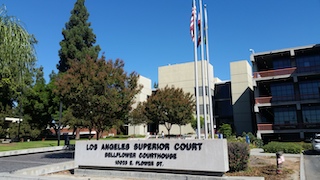Our client, age 32, and his wife were not on good terms. One weekend evening, she went to spend time with her family in Torrance while our client remained at home in Bellflower.
Our client called up a buddy and the two went out to a bar to watch sports and relax over a beer or two. While our client was out with his friend, his wife was texting him furiously, asking him what he was doing and when he’d be back home. Our client ignored the texts.
Finally, our client and his buddy called it a night and our client went home. When he got home, his wife and his children were there and our client grabbed his Smith & Wesson handgun and walked out of the house. His wife could tell he had been drinking and scolded him for going out to drive. When asked where he was going, our client said he was headed over to his parents’ home.
The firearm was registered to our client and the wife did not see our client with any ammunition or even an empty clip. Our client had no prior criminal history at all.
Our client’s wife became concerned for what might happen next. She called 911 and told the dispatcher that her husband had left the house and was driving toward his parents’ home with a gun. She did not say he was drunk or that the weapon was loaded because she did not know if it was loaded. She did not even tell the dispatcher that our client was angry.
Interestingly, the 911 dispatcher did not ask our client’s wife if the gun was loaded, but told deputies in the area that our client had a loaded handgun, was drunk and was angry. In other words, the story became more urgent due to some poetic liberties of the police.
Our client’s wife had a cell phone tracking app on her phone, so she was able to tell police exactly where our client was at all times.
Eventually, our client stopped at a 7-11 and police pulled in behind him.
Police ordered our client out of the car and immediately searched the car without our client’s consent. They found a loaded Smith & Wesson handgun with .40 caliber rounds loaded.
Our client was then immediately arrested for being in possession of a loaded firearm in a vehicle, a violation of Penal Code § 25658(a), a misdemeanor.
 Bellflower Courthouse
Bellflower Courthouse
After the client posted bail, he trusted the public defender with his defense. At the arraignment at the Bellflower Courthouse, the initial offer from the public defender was three years of informal probation, 30 days of county jail and a $300 fine, plus penalties and assessments (total of about $1,400 owed).
The client called Greg Hill & Associates and spoke to Greg. The client explained what had happened and how he thought the search of his car was illegal because the police did not have consent to search the vehicle. He also told Greg what the initial offer was and asked Greg if he thought he could help.
Greg was hesitant to promise anything and commented that the vehicle search might have been proper under the automobile exception to the Fourth Amendment, but that he needed to read the police report to see what other circumstances were known to the police at the time.
Greg was then retained and substituted in as counsel of record. When Greg listened to the 911 call recording and realized that the wife never told the police that the weapon was loaded, or that her husband was angry or that the client was drunk. Greg now looked at the case as an illegal traffic stop. After all, it is not illegal to transport an unloaded gun from one place to another, as that was all the information the police had to work with, yet they made a traffic stop of our client.
Greg Hill & Associates then prepared a motion to suppress the evidence of the loaded weapon based on an illegal traffic stop. At the hearing on the motion, the police officer who made the stop and searched our client’s car testified that he indeed did not know if the weapon was loaded, or if our client was drunk or if he was angry. The 911 call was then played for the judge to hear. Greg argued that under the totality of the circumstances did not allow a traffic stop, as there was no Vehicle Code violation for the parked car in a 7-11 parking lot.
Moreover, police could have requested a search warrant, but did not.
The judge denied the motion, reasoning that the police had a right to assume the gun was loaded and to proceed with a sense of urgency.
The judge also said the search of the client’s car was proper due to the public safety concern of a loaded firearm, which made no sense.
The prosecutor seemed to sympathize with our client and our motion, reducing the offer to three years of informal probation and just ten days of community labor, plus total court fines of $220.
In other words, the motion to suppress and hiring Greg Hill & Associates saved our client 30 days in county jail and over $1200 in court fines and fees. The client accepted the new offer, although he still insisted that the judge had made a mistake in her ruling on our motion.
Contact us.  Bellflower Courthouse
Bellflower Courthouse